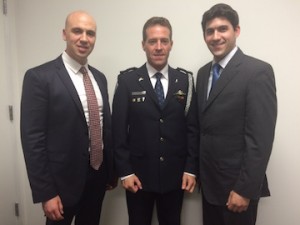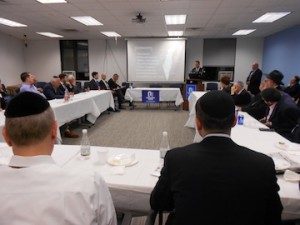
One of the most dangerous elements of the recent wave of terror in Israel is who the attackers are.
“They are young Israeli Arabs who are part of Israeli society, who work with us, come inside our schools, hospitals,” explained Superintendent Mickey Rosenfeld, foreign press spokesperson for the Israeli Police. “The attacks are sporadic. [Terrorists] are not being given orders from Hamas in the Gaza Strip… We are talking about individuals. Someone who walks in the Old City unarmed and walks past our police officers; he then buys a knife and carries out an attack.”
On Nov. 5, the OU welcomed Rosenfeld to speak to a select group of New York metro’s Jewish community leaders and synagogue security chairs about how the Israeli National Police is dealing with the current crisis. The event was arranged through Our Soldiers Speak, a New York-based organization that sends IDF soldiers and members of the Israeli police force to English speaking college campuses and organizations to present an accurate picture of the Israeli/Arab conflict.
“Hosting Superintendent Rosenfeld was an important opportunity for him to share the facts on the ground and the realities that the news is not reporting,” said Yehuda Friedman, associate director of the department of synagogue services, who organized the event with Our Soldiers Speak. “He gave synagogues and communities guidance and he stressed the importance of vigilance and advised communities to think and act proactively.”

Rosenfeld’s visit to the OU came at the heels of his trip to Washington DC, where he met with members of Congress to recount the serious and constant threat that the people of Israel live under. Between October 1 and November 8, 12 people have been killed and 158 wounded, 20 seriously.
According to Rosenfeld, over the past five weeks, 3,500 officers have been deployed in Jerusalem, including operations, intelligence, undercover, special patrol, and border police units; 900 extra private security guards have been assigned to public buses, and more than 300 IDF personnel are working under the command of the Israeli National Police to prevent and respond to the terrorist attacks.
Another change in the current terror wave, Rosenfeld mentioned, is the Israeli’s police’s reaction to it. Unlike in the past, when the graphic footage of terrorist attacks was kept from public view, videos of the attacks are now put out through the foreign press’s spokesman department. The videos are being distributed, “in order that the foreign media and the members of the public get a full picture of what’s going on and that they cover it,” explained Rosenfeld. “What we’re seeing is that not all of the information put out to the foreign media in Israel by the police is being taken. Today we are in a decade of media and there’s a frontline battle taking place in the media world.”
During the hour-and-a-half presentation, Rosenfeld spoke about the role of social media in the terrorist attacks.
Young Israeli Arabs and Palestinians are incited on social media to attack Israeli civilians and then the attacks play out soon after. “At 9:00 a.m. a terrorist puts out the information on Facebook that he or she wants to carry out an attack,” said Rosenfeld. “At 3:00 in the afternoon, that same terrorist carries out the attack.”
The main solution is constant vigilance. Rosenfeld listed the 320 cameras in the Old City that enable Israeli police to see terrorists when they approach the Old City. “Just over two weeks ago, I was walking around the streets wearing a protective jacket and communicating with the officers in intelligence and the observation center,” stated Rosenfeld. “They were telling me where there were suspects and if there were any coming my way. The coordination on the ground level is essential.”
During the presentation, Rosenfeld showed a video of terrorist attack at the Damascus Gate. Spt. Rosenfeld gave a blow-by-blow as the footage of the incident unfolded. “We see a suspect sitting in the blue top,” he said. “The police are asking for his ID and in very close range he stabs three officers. Their response is immediate; the suspect is shot and killed.”
That is not the optimum result though, Rosenfeld clarified.
“If our officers can make an arrest, it’s an advantage,” he said. “We bring in the suspects for intelligence reasons. We find out how they made their way inside a specific area and that intelligence leads us to other suspects. In some cases there is no other choice but to shoot and kill. It is not the policy of the Israeli national police; the policy is to make sure that the streets are safe, but sometimes our police officers have to make split second decisions and have to respond.”
The superintendent reassured attendees that, despite the recent tensions on Israeli streets, the country is not on the level of threat that it was a decade ago. He advised them to apply effective security measures for the American Jewish population.
“One does not have to wait for a terrorist attack and then respond,” he said. “You have to analyze the threats, map them out according to the different areas. If there are threats… transfer that information to the local police and step up patrols in areas. Strengthen the connection with local authorities. The threats are real and definitely out there.”
David Pollock, of the Jewish Community Relations Council of New York, said that after the presentation he felt that Jewish institutions needed to “step up their game.”
“We have to do more training,” he said. “Each organization has to develop a culture of security.”
Michael Wildes, former mayor of Englewood, concurred. “Jews in the Diaspora have to develop a sense of propriety when it comes to dealing with matters of security and terrorism. I realized it was my job as an American [Jew] to educate people on the threats that we face.”
The words of this author reflect his/her own opinions and do not necessarily represent the official position of the Orthodox Union.
